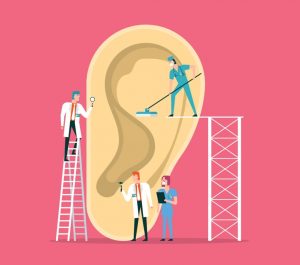Factors such as ageing, injury and infection can cause sensorineural hearing loss, which is the most common type of hearing loss. However, the hearing loss caused by an ear infection is known as conductive hearing loss.
When the middle ear is infected, it can cause fluid to build up and obstruct the movement of the eardrum and the tiny bones attached to it, resulting in a loss in hearing. Conductive hearing loss is usually temporary and subsides after treatment.
Removing the fluid buildup will relieve the pain and pressure that generally come with an ear infection and prevent a rupture in the eardrum.
How to Know If You Have an Ear Infection?
Look out for the following ear infection symptoms if you suspect a hearing loss.
- Dizziness or imbalance
- Frequent pain in the ear
- Difficulty in understanding speech
- Vomiting or nauseous feeling
- Feeling pressure in the ears
For those who live locally, if you notice any of the above symptoms, see an ENT specialist at Perfect Hearing in Johor Bahru or Melaka. When it has to do with the ears, you need to act quickly because a middle ear infection can be treated easily, without you having to suffer any hearing loss.
Treatment For Middle Ear Infections
In treating middle ear infection, two steps are involved. The pain will first be treated, and if the symptoms persist, your ENT doctor will prescribe antibiotics to treat the condition.
Some doctors may delay using antibiotics to treat patients because an otherwise healthy individual may be well able to fight the infection without medication, helping you to avoid any side effects that may come with taking antibiotics.
Most ENT specialists recommend focusing on managing the pain for the first one or two days before using antibiotics. For pain relief, doctors may recommend ibuprofen and acetaminophen, and occasionally ear drops that contain pain medicine.
When doctors prescribe antibiotics to treat middle ear infection, it is likely amoxicillin. This works well in fighting the infection. After some days, the inflammation will stop completely, and the Eustachian tubes can adequately ventilate the middle ear.
Until the fluid in your ear is cleared, you may be prone to recurrent infections. Therefore, it’s vital to complete the whole course of the treatment even when you no longer experience any symptoms. After several days of treatment, you may notice that you can hear better. That’s a sign that the fluid buildup is drying up or dried up completely.
Recurrent Ear Infections
If the middle ear infection is recurring, and there’s still some fluid trapped inside, causing you a temporary hearing loss, your ENT doctor may recommend ear tube surgery. It is a surgical procedure that has to do with inserting tubes in the eardrum.
The procedure is done by making a small incision in the eardrum. Next, the tube will be placed inside. The tube is known medically as a pressure equalization tube. It helps to aerate the middle ear, allowing any trapped fluid drain. However, this procedure is rare and is reserved for people with chronic middle ear infections.
Prevention Tips
An ear infection is often caused by a bacterium or virus in the middle ear. Illnesses such as the cold, flu or allergy can result in an ear infection. Colds and flu are contagious and can quickly spread.
And, sometimes, it can be difficult to prevent yourself from getting sick. However, here are some factors you can control:
- Reduce your exposure to secondhand smoke
- Get vaccinated against the flu every year
- Wash your hands frequently and use hand sanitizers
- Cough into your elbow, not your hands
- When swimming, use earplugs
Are you having trouble with your hearing? If you do, you should have your hearing tested by a professional, so that the degree and cause can be identified.
If you suspect you have an ear infection, visit Perfect Hearing and talk to our ENT specialists to identify the cause and recommend the best treatment option to follow. Our clinics are situated all around Malaysia, including Johor Bahru and Melaka.



